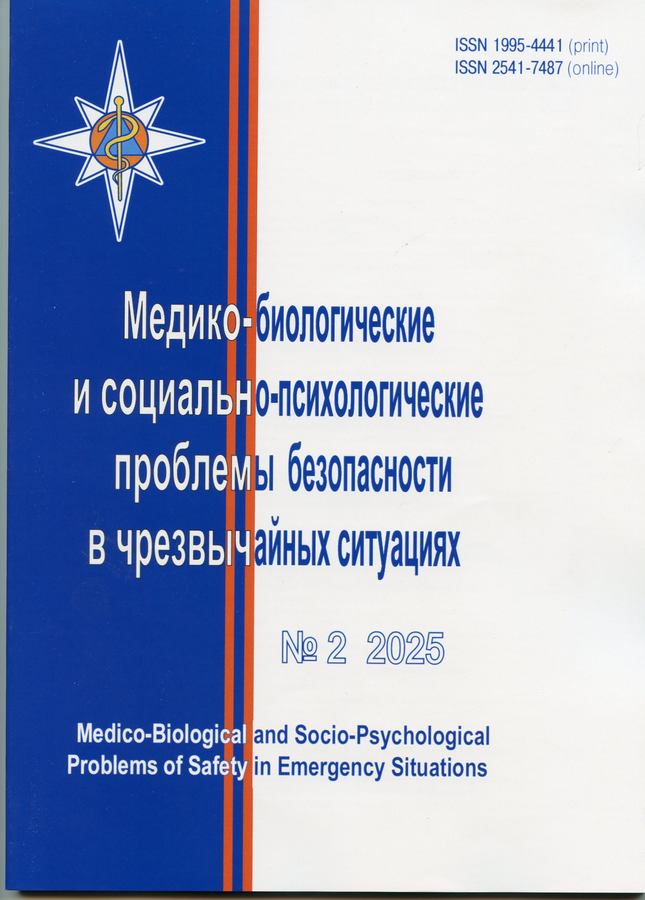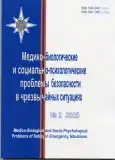Анализ риска реализации патологии верхних отделов органов пищеварения в стратегии сохранения здоровья военнослужащих – участников боевых действий
- Авторы: Ушаева Л.А.1, Шубин Л.Б.2, Завьялов Д.В.2
-
Учреждения:
- 2–й Военный клинический госпиталь Войск национальной гвардии России
- Ярославский медицинский университет
- Выпуск: № 2 (2025)
- Страницы: 51-62
- Раздел: Медицинские проблемы
- URL: https://journal-vniispk.ru/1995-4441/article/view/311056
- DOI: https://doi.org/10.25016/2541-7487-2025-0-2-51-62
- ID: 311056
Цитировать
Полный текст
Аннотация
Актуальность . Вопросы укрепления профессионального здоровья военнослужащих являются одной из главных задач военной медицины. В современных условиях отсутствуют данные о факторах риска, участвующих в реализации патологии верхних отделов желудочно–кишечных болезней у участников боевых действий (комбатантов). Цель оценка вероятной распространенности заболеваний верхних отделов органов пищеварения (как новых случаев, так и обострений уже существующих патологий) с учетом существования в настоящий момент воздействия конкретных факторов риска, их числа и интенсивности у военнослужащих Росгвардии в различных условиях военной службы (на примере комбатантов). Методология . Обследованы военнослужащие Северо–Кавказского округа Войск национальной гвардии России (n = 256) с отягощенным гастроэнтерологическим анамнезом, из них комбатантов 118, неучаствующих в боевых действиях 138. Группы военнослужащих сформировали случайным образом по мере поступления их в госпиталь на лечение и реабилитацию. Распространенность заболеваний верхних отделов органов пищеварения (XI класс по Международной классификации болезней и проблем, связанных со здоровьем, МКБ–10) оценивали методом анализа частот в таблицах сопряженности на основании данных о заболеваемости за период с февраля 2022 г. по 2023 г., эпидемиологическую значимость факторов по атрибутивному риску и его этиологической доли, относительному риску и оценке шансов. Результаты и их анализ. При сравнении частоты встречаемости гастропатологии в группе комбатантов выявлено преобладание изолированных и сочетанных острых эрозивно–язвенных повреждений слизистой оболочки пищевода, желудка и двенадцатиперстной кишки и хронических язв двенадцатиперстной кишки (K20–K31 по МКБ–10), преимущественно, у кадровых офицеров 93 (79 %), тогда как в контрольной группе преобладала хроническая язвенная болезнь 41 % и в меньшей сочетанные эрозивно–язвенные повреждения 7 %, также в основном у кадровых офицеров (29 %). Оказалось, что выявленные клинико–эпидемиологические тенденции и достоверные различия между группами не случайны и зависят от конкретных факторов. Основываясь на данных выполненной рискометрии в группе участников боевых действий, статистически доказана значимость 11 управляемых факторов риска с общим весом 43 % и 9 частично управляемых факторов риска с удельным весом 33 %, способствующих реализации выявленной патологии у комбатантов. Заключение . Знание изменений в распространенности заболеваний верхних отделов органов пищеварения (как новых случаев, так и обострений уже существующих патологий) с учетом существования в настоящий момент воздействия конкретных факторов риска, их числа и интенсивности у обследованных военнослужащих Росгвардии в различных условиях военной службы (на примере участников боевых действий) позволяет применить концепцию управления рисками для снижения заболеваемости военнослужащих болезнями органов пищеварения, что имеет решающее значение в стратегии сохранения их здоровья.
Об авторах
Л. А. Ушаева
2–й Военный клинический госпиталь Войск национальной гвардии России
Автор, ответственный за переписку.
Email: LBSH@yandex.ru
357501, г. Пятигорск, ул. Партизанская, д 1
Л. Б. Шубин
Ярославский медицинский университет
Email: LBSH@yandex.ru
150000, г. Ярославль, ул. Революционная, д. 5
Д. В. Завьялов
Ярославский медицинский университет
Email: LBSH@yandex.ru
150000, г. Ярославль, ул. Революционная, д. 5
Список литературы
- Биккинина Г.М., Мингазова Л.Р. Обоснование подходов к реализации превентивных мероприятий профессионально-обусловленной патологии у сотрудников силовых структур // Сиб. мед. журн. 2011. Т. 26, № 4-1. С.166–170.
- Болкисева П.С., Фазылзянова А.Р., Ямщикова Т.В. и др. Выявление факторов риска возникновения заболеваний органов пищеварения // Modern science. 2020. № 12 (2). С. 48–50.
- Дампилова Н.Ю. Болезни органов пищеварения у военнослужащих-участников ликвидации последствий Чернобыльской катастрофы: автореф. дис. … канд. мед. наук. СПб., 2010. 21 с.
- Денега В.И., Фадеев А.В., Кручинина Н.Е. [и др.]. Сравнительная характеристика некоторых факторов патогенеза хронической гастродуоденальной патологии у военнослужащих различных профессиональных групп // Воен.-мед. журн. 2006. Т. 327, № 4. С. 29–96.
- Евдокимов В.И., Сиващенко П.П., Григорьев С.Г. Показатели заболеваемости военнослужащих контрактной службы Вооруженных сил Российской Федерации (2003–2016 гг.): монография / Воен.-мед. акад. им. С.М. Кирова, Всерос. центр экстрен. и радиац. медицины им. А.М. Никифорова МЧС России. СПб.: Политехника-принт, 2018. 80 с. (Сер. «Заболеваемость военнослужащих»; вып. 2).
- Евдокимов В.И., Сиващенко П.П., Григорьев С.Г. Показатели заболеваемости офицеров Вооруженных сил Российской Федерации (2003–2016 гг.): монография / Воен.-мед. акад. им. С.М. Кирова, Всерос. центр экстрен. и радиац. медицины им. А.М. Никифорова МЧС России. СПб.: Политехника-принт, 2018. 80 с. (Сер. «Заболеваемость военнослужащих»; вып. 1).
- Евдокимов В.И., Сиващенко П.П., Григорьев С.Г., Емельянов А.Ю. Роль основных болезней в формировании показателей заболеваемости офицеров Вооруженных сил России в 2003–2016 гг. // Мед.биол. и соц.-психол. пробл. безопасности в чрезв. ситуациях. 2018. № 1. С. 19–29. doi: 10.25016/25417487-2018-0-1-19-29.
- Еганян Р.А., Кушунина Д.В., Калинина А.М. Актуальность и результативность раннего выявления заболеваний органов пищеварения при диспансеризации взрослого населения России // Профилактическая медицина. 2017. Т. 20, № 3. С. 22–27. doi: 10.17116/profmed201720322-27.
- Ивашкин В.Т., Маев И.В., Царьков П.В. [и др.]. Диагностика и лечение язвенной болезни у взрослых (Клинические рекомендации Российской гастроэнтерологической ассоциации, Российского общества колоректальных хирургов и Российского эндоскопического общества) // Рос. журн. гастроэнтерологии, гепатологии, колопроктологии. 2020. Т. 30, № 1. С. 49–70. doi: 10.22416/1382-4376-2020-30-1-49-70.
- Карташов И.Г. Условия жизни военнослужащих по контракту как фактор их здоровья // Воен. социология. 2008. № 2. С. 118–122.
- Квасов С.Е., Подушкина И.В., Абанин А.М. [и др.]. Донозологическая диагностика как методологическое обоснование потребности в обучающих программах по здоровому образу жизни у военнослужащих силовых ведомств // Мед. альманах. 2010. Т.12, № 3. С. 22–26.
- Котова Е.Г., Александрова Г.А., Кобякова О.С. [и др.]. Общая заболеваемость взрослого населения России в 2021 году: стат. материалы. М.: Центр. науч.-исслед. ин-т организации и информ. здравоохранения, 2022. 164 c.
- Лизунов Ю.В., Ерофеев В.Г. Возможные факторы риска для здоровья военнослужащих в условиях локальных вооруженных конфликтов // Вестн. Рос. воен.-мед. акад. 2018. № 1. С. 102–104.
- Мириджанян Г.М. Мониторинг факторов риска развития болезней органов пищеварения (по материалам исследования в г. Ереване, Армения) // Ремедиум. 2017. № 6. С. 20–23.
- Папушин О.Н. Влияние факторов военной службы на течение гастро-эзофагельной рефлюксной болезни: автореф. дис. … канд. мед. наук. М., 2007. 21 с.
- World Health statistic 2014. Geneva: WHO, 2014. 177 p.
- Fletcher R.H., Fletcher S.W., Fletcher G.S. Clinical Epidemiology. The Essentials: 5th Edition / Lippincott Williams & Wilkins, a Wolters Kluwer business, 2014. 255 p.
Дополнительные файлы










